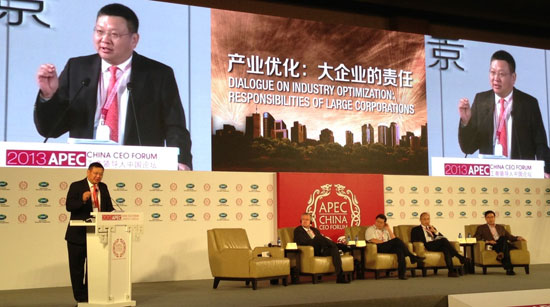CKGSB Dean Xiang Bing and Professor Cho Dong-Sung, respectively moderated a session and gave a keynote address at the APEC China CEO Forum 2013.
The APEC China CEO Forum is an annual meeting of leading international and Chinese CEOs and decision makers who engage in dialogues regarding the challenges and opportunities of the increasingly dynamic Chinese economy. It provides an exclusive insight of Chinese business, as well as a crucial networking opportunity for business experts and leaders. This year’s theme was entitled “China in Transition: New Leadership, New Prospects”

CKGSB Founding Dean Xiang Bing moderated the session entitled “Dialogue on Industry Optimization: Responsibilities of Large Corporations”. In his remarks Dean Xiang Bing showed a high level of confidence regarding the economic future of China, giving five main reasons for his optimism. With only 51% of people living in urban areas and with services only accounting for 43% of GDP, there is still a huge untapped potential in the Chinese market. Having become the world’s largest industrial region, and with good prospects in the sector the coming decade, further talent and capital are on their way. Population growth will at the same time be positive in the next 8-10 years, bringing about even further market expansion. And last, with multinationals operating in China and Chinese companies investing abroad, the scope and success of market reforms and opening in China have surpassed all expectations.
In Dean Xiang’s words, these factors create an immense economic opportunity; consequently China should also be more confident in overcoming its weaknesses, namely innovative capacity. Some argue that Chinese lack innovation, and think that China will never be able to match the US in this respect. However many forget that the reason for such lack of innovation has been that in China one could succeed even without innovating. But China is changing, and innovation is increasingly necessary for success. The reason for the US being a world leader in innovation is the size and development of its market, which attracts the best talent globally. US innovation is not merely the work of Americans, but also of Indians, Italians, Chinese and others alike. With the Chinese economy growing, so grows its thirst for talent and innovative potential.
Later in the day Cho Dong-Sung, Professor of Strategy at CKGSB, opened the afternoon session with a keynote speech. His keynote illustrated his vision for a new version of capitalism, centered on business clusters, which differently from known models of capitalism, reconciles the interests of the market, government, business and society. He defined it as Capitalism 5.0.
Professor Cho began by outlining the different versions of capitalism that the global economy has experienced in its economic history, explaining their features and limitations. Adam Smith’s free market system was the first, defined by him as Capitalism 1.0. Capitalism 2.0 and 3.0 were respectively Keynesianism and Neoliberalism, the first giving economic authority to the government, while the second to business. With rising dissatisfaction with business behavior and impact on society, as seen in the more recent “Occupy Wall Street” movement, we have seen the rise of a form of capitalism which attempts reconciliation between the interests of business and society, Capitalism 4.0. However, with the business dominance of the market, there is the likely risk of falling back in version 3.0 due to lofty corporate social responsibility.
Therefore, there is need for a new version of capitalism, argued professor Cho, which brings about innovation and growth, while at the same time reconciles the conflicting interests of today’s complex economies. Business clusters –such as the Silicon Valley, Zhongguancun IT district and Wall Street– can act as the driving force of such new model. With this respect the government can provide for the necessary regulation and organizational needs, so to match its macroeconomic priorities and control for corporate social behavior. Collusion between business and government seems an issue in such system. However with increasing transparency and better standards such risks are significantly lowered, allowing this new capitalist model to be highly successful. If so, Capitalism 5.0 could become the new driving force of a new dynamic global economy.